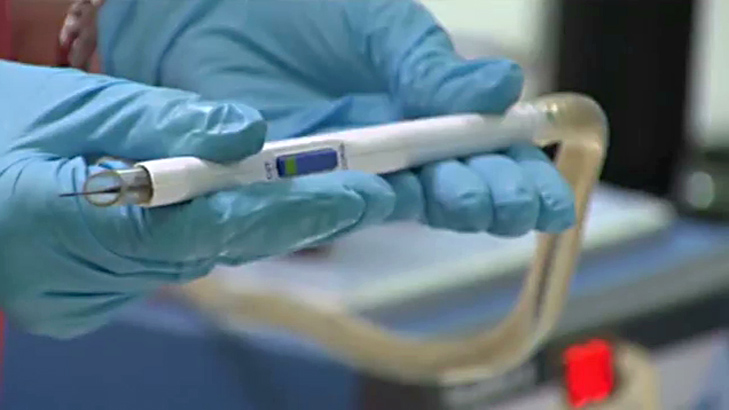An innovative medical device dubbed an “intelligent knife,”or “iKnife” that has been under development for several years by a team of researchers at Imperial College, London, is entering clinical trials. The iKnife’s marquee capability is detecting cancer cells in smoke emitted by body tissues during electrocautery, a technique that uses an electric current to rapidly heat soft tissue so that surgeons can cut through it with minimal loss of blood. Electrocautery has largely supplanted old-school techniques that utilize a keen cutting edge and muscle power, and the gases it releases as tissue burns at the point of incision carries the molecular signature of the tissue.
The team of Imperial scientists led by the surgical innovator Professor Ara Darzi, a Professor of Surgery at Imperial College London and Honorary Consultant Surgeon at Imperial College Hospital NHS Trust, and Professor Jeremy Nicholson, who has pioneered the science of metabonomics, say that with the iKnife, surgeons are given a near real-time (approximately three seconds) running assessment of whether cells of tissues being incised are healthy or cancerous, instantly providing information that normally takes up to half an hour to reveal using laboratory tests, according to the device’s development team.
Because some vapors released by electrocautery can be potentially harmful, the emissions are usually scavenged and directed into an evacuation system. With the iKnife, they are instead routed into a mass spectrometer, which gives a rapid readout of the chemical composition of the smoke. Different types of cells produce thousands of metabolites in different concentrations, so the profile of chemicals in a biological sample can reveal information about the state of that tissue. The researchers report preliminary findings of strong evidence that different tissue types and disease states give off different molecular signature in electrocautery smoke.
If proved re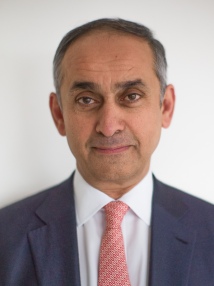 liable in trials, the iKnife could revolutionize the way in which surgeons make decisions in the operating room on where and when to cut, representing a major advance in both efficiency and economy over the current conventional process for detecting and removing cancerous tissue, then using a mass spectrometer to analyze biopsy samples at the molecular level.
liable in trials, the iKnife could revolutionize the way in which surgeons make decisions in the operating room on where and when to cut, representing a major advance in both efficiency and economy over the current conventional process for detecting and removing cancerous tissue, then using a mass spectrometer to analyze biopsy samples at the molecular level.
“We’re looking to completely transform the way that surgeons make sure they’re cutting in exactly the right place,” Professor Darzi says in an Imperial College release. “This will make surgery safer and improve our success rates at removing cancers. Ultimately, we hope to apply this approach to less invasive types of surgery, such as endoscopy and keyhole surgery. We think metabolic tissue profiling could really improve the way in which we carry out all sorts of operations.
Waters Corporation Acquires iKnife Technology
Last month, Waters Corporation of Milford, Massachusetts, a leading analytical instrument manufacturer, announced that it has secured a deal to acquire the technology behind the Imperial College London’s iKnife, called “Rapid Evaporative Ionization Mass Spectrometry” (REIMS), from MediMass Ltd, a company created by the iKnife’s inventor, Imperial College Professor Zoltan Takats.
Waters’ experience with REIMS technology stems from a three-year collaboration among Waters, MediMass and Imperial College London focused on investigating applications of REIMS in surgery. The goal of this relationship has been and continues to be advancing REIMS technology capabilities for health science applications. Imperial researchers will continue to work with Waters scientists to explore applications for the iKnife with hospitals in Imperial College Healthcare NHS Trust, the College’s partner in the Imperial Academic Health Science Centre (AHSC).
“While showing promise across many applications, REIMS technology significantly strengthens Waters’ technology position within Health Sciences,” said Rohit Khanna, Vice-President, Worldwide Marketing and Informatics, Waters Division says in a statement. “This technology acquisition along with our recent agreement with Prosolia, Inc. for the exclusive rights to Desorption Electrospray Ionization (DESI) technology in clinical applications are key components in our burgeoning Heath Sciences initiative. Both direct-from-sample ion source technologies are strategic discriminators as we look to grow the impact of mass spectrometry throughout the Health Sciences Continuum.”
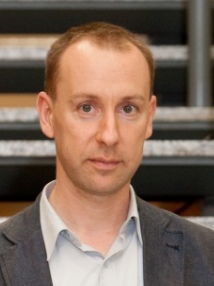 Commenting on the Waters Corporation acquisition of the iKnife REIMS technology, Professor Takats notes that “The first development of ambient mass spectrometric methods 10 years ago was welcomed as a revolution, multiplying the potential areas in which mass spectrometry could be applied in daily life. Waters’ acquisition of MediMass’ technology represents a significant opportunity in the development of a new generation of devices for medical diagnostics and food safety just to mention a couple of the potential application fields.”
Commenting on the Waters Corporation acquisition of the iKnife REIMS technology, Professor Takats notes that “The first development of ambient mass spectrometric methods 10 years ago was welcomed as a revolution, multiplying the potential areas in which mass spectrometry could be applied in daily life. Waters’ acquisition of MediMass’ technology represents a significant opportunity in the development of a new generation of devices for medical diagnostics and food safety just to mention a couple of the potential application fields.”
Professor Nicholson, Department of Surgery and Cancer at Imperial College London, observes in an Imperial College release that “The Waters Corporation is in a unique position to develop REIMS technology for clinical, microbiology and food safety applications — each potentially bringing significant benefit to patients and consumers alike.”
 Professor Dermot Kelleher, Dean of the Faculty of Medicine at Imperial, comments: “We are delighted that work from our Academic Health Science Centre has the potential to directly impact outcomes for patients both within the NHS and at a global level. This is an excellent example of how clinical academic innovation can have implications for both health and wealth.”
Professor Dermot Kelleher, Dean of the Faculty of Medicine at Imperial, comments: “We are delighted that work from our Academic Health Science Centre has the potential to directly impact outcomes for patients both within the NHS and at a global level. This is an excellent example of how clinical academic innovation can have implications for both health and wealth.”
Imperial College’s Sam Wong reported that in the first study to test the invention in the operating theatre, the iKnife diagnosed tissue samples from 91 patients with 100 percent accuracy.
These initial results were published last fall in the journal Science Translational Medicine. The study was funded by the National Institute for Health Research (NIHR) Imperial Biomedical Research Centre, the European Research Council and the Hungarian National Office for Research and Technology.
The Science Translational Medicine article, entitled “Intraoperative Tissue Identification Using Rapid Evaporative Ionization Mass Spectrometry” (Sci Transl Med published online 24 September 2013 Vol. 5, Issue 194, p. 194ra93 DOI: 10.1126/scitranslmed.3005623) is coauthored by Jlia Balog of MediMass Ltd., Budapest, Hungary; Lszl Sasi-Szab, of the Institute of Surgery, Medical and Health Science Centre, University of Debrecen at Debrecen, Hungary; James Kinross, Matthew R. Lewis, Laura J. Muirhead, Jeremy K. Nicholson, Zoltn Takts, and Kirill Veselkov of Computational and Systems Medicine, Department of Surgery and Cancer, Faculty of Medicine, Imperial College London; (Kinross also associated with the Section of Biosurgery and Surgical Technology, Department of Surgery and Cancer); Balzs Dezs of the Institute of Pathology, Medical and Health Surgery and Cancer; and Reza Mirnezami and Ara Darzi of the Section of Biosurgery and Surgical Technology, Faculty of Medicine, Imperial College London.
[adrotate group=”3″]
The coauthors report that rapid evaporative ionization mass spectrometry (REIMS) allows near real-time characterization of human tissue in vivo by analysis of the aerosol (smoke) released during electrosurgical dissection, and that the coupling of REIMS technology with electrosurgery for tissue diagnostics is known as the intelligent knife (iKnife).
This study aimed to validate the technique by applying it to analysis of fresh human tissue samples ex vivo and to demonstrate the translation to real-time use in vivo in a surgical environment. A variety of tissue samples from 302 patients were analyzed in the laboratory, resulting in 1624 cancerous and 1309 noncancerous database entries. The technology was then transferred to the operating room, where the device was coupled to existing electrosurgical equipment to collect data during a total of 81 resections, recording characteristics of thousands of cancerous and non-cancerous tissues, including brain, lung, breast, stomach, colon and liver tumours to create a reference library.
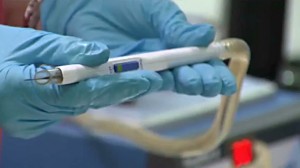 The technology was then transferred to the operating theatre to perform real-time analysis during surgery. In all 91 tests, the tissue type identified by the iKnife matched the post-operative diagnosis based on traditional methods.
The technology was then transferred to the operating theatre to perform real-time analysis during surgery. In all 91 tests, the tissue type identified by the iKnife matched the post-operative diagnosis based on traditional methods.
The researchers note that mass spectrometric data were analyzed using multivariate statistical methods, including principal components analysis (PCA) and linear discriminant analysis (LDA), and a spectral identification algorithm using a similar approach was implemented.
They report that the REIMS approach differentiated accurately between distinct histological and histopathological tissue types, with malignant tissues yielding chemical characteristics specific to their histopathological subtypes. Tissue identification via intraoperative REIMS matched the postoperative histological diagnosis in 100% (all 81) of the cases studied. The mass spectra reflected lipidomic profiles that varied between distinct histological tumor types and also between primary and metastatic tumors. Thus, in addition to real-time diagnostic information, the spectra also provided information on divergent tumor biochemistry that may have mechanistic importance in cancer. While the iKnife was being tested, surgeons were unable to see the results of its readings. The clinical trial will be to determine if giving surgeons access to the iKnife’s analysis can improve patients’ outcomes.
The Imperial College release observes that in cancers involving solid tumors, removal of the diseased tissue in surgery is generally the best hope for treatment. The surgeon normally removes the tumor along with a margin of healthy tissue. However, the scientists note that it is often impossible to tell by sight which tissue is cancerous, and that one in five breast cancer patients who have surgery require a second operation to fully remove the cancer, and n cases of uncertainty, the removed tissue is sent to a lab for examination while the patient remains under general anesthetic.
Dr. Takats, a coauthor of the Science Translational Medicine study, realized that electrocautery smoke would be a rich source of biological information, and to create the iKnife, he connected an electrosurgical knife to a mass spectrometer. Dr. Takats has pursued pioneering research in mass spectrometry and one of the founders of the field of Ambient Mass Spectrometry is the primary inventor of six mass spectrometric ionization techniques and author of 78 peer reviewed publications, as well as recipient of the prestigious Mattauch-Herzog Award of the German Mass Spectrometry Society and the Hungarian Star Award for Outstanding Innovators. Dr. Takats is founder of Prosolia Inc, Medimass Ltd and Massprom Ltd. — all companies pursuing analytical and medical device development.
“These results provide compelling evidence that the iKnife can be applied in a wide range of cancer surgery procedures,” Dr Takats comments. “It provides a result almost instantly, allowing surgeons to carry out procedures with a level of accuracy that hasn’t been possible before. We believe it has the potential to reduce tumor recurrence rates and enable more patients to survive.”
Although the current study focussed on cancer diagnosis, Dr Takats says the iKnife can identify many other features, such as tissue with an inadequate blood supply, or types of bacteria present in the tissue. He has also carried out experiments using it to distinguish horsemeat from beef.
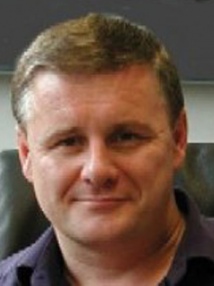 Professor Jeremy Nicholson, also a study co-author, says that “The iKnife is one manifestation of several advanced chemical profiling technologies developed in our labs that are contributing to surgical decision-making and real-time diagnostics. These methods are part of a new framework of patient journey optimisation that we are building at Imperial to help doctors diagnose disease, select the best treatments, and monitor individual patients progress as part our personalized healthcare plan.”
Professor Jeremy Nicholson, also a study co-author, says that “The iKnife is one manifestation of several advanced chemical profiling technologies developed in our labs that are contributing to surgical decision-making and real-time diagnostics. These methods are part of a new framework of patient journey optimisation that we are building at Imperial to help doctors diagnose disease, select the best treatments, and monitor individual patients progress as part our personalized healthcare plan.”
Study coauthor Professor Darzi, whose full title is The Lord Darzi Of Denham PC KBE FRS FMEDSCI HONFRENG, is cited saying: “In cancer surgery, you want to take out as little healthy tissue as possible, but you have to ensure that you remove all of the cancer. There is a real need for technology that can help the surgeon determine which tissue to cut out and which to leave in. This study shows that the iKnife has the potential to do this, and the impact on cancer surgery could be enormous.”
Professor Darzi holds the Paul Hamlyn Chair of Surgery at Imperial College London, the Royal Marsden Hospital and the Institute of Cancer Research. He is Director of the Institute of Global Health Innovation at Imperial College London and Chair of Imperial College Health Partners. He is an Honorary Consultant Surgeon at Imperial College Hospital NHS Trust. Research led by Professor Darzi is directed towards achieving best surgical practice through innovation in surgery and enhancing patient safety and the quality of healthcare. His contribution within these research fields has included over 800 peer-reviewed research papers to date. In recognition of his achievements in the research and development of surgical technologies, Professor Darzi has been elected as an Honorary Fellow of the Royal Academy of Engineering; a Fellow of the Academy of Medical Sciences and in 2013 was elected as a Fellow of the Royal Society.
He was knighted for his services in medicine and surgery in 2002. In 2007, he was introduced to the United Kingdom’s House of Lords as Professor the Lord Darzi of Denham and appointed Parliamentary Under-Secretary of State at the Department of Health. Upon relinquishing this role within central government in 2009, Professor Darzi sat as the United Kingdom’s Global Ambassador for Health and Life Sciences until March 2013. During this appointment and beyond Professor Darzi has developed his status as a leading voice in the field of global health policy and innovation. He was appointed and remains a member of Her Majesty’s Most Honorable Privy Council since June 2009.
Lord Darzi observes that “The iKnife has shown potential to provide surgeons with crucial diagnostic information during surgery, but it requires significant further development to become an approved medical device. With Waters backing allied to the chemistry and spectroscopy expertise in our department and the access to patients facilitated by the AHSC, the elements are in place to fulfill that development.”
Last year, Imperial College London researchers published in the journal Science Translational Medicine the results of a preliminary study which demonstrated the concept of using the iKnife to identify different types of tissue in real time. The team are now conducting larger studies to assess whether the iKnife can provide useful diagnostic information during surgery.
Sources:
Imperial College, London
Waters Corporation
Science Translational Medicine
Image Credits:
Imperial College, London

